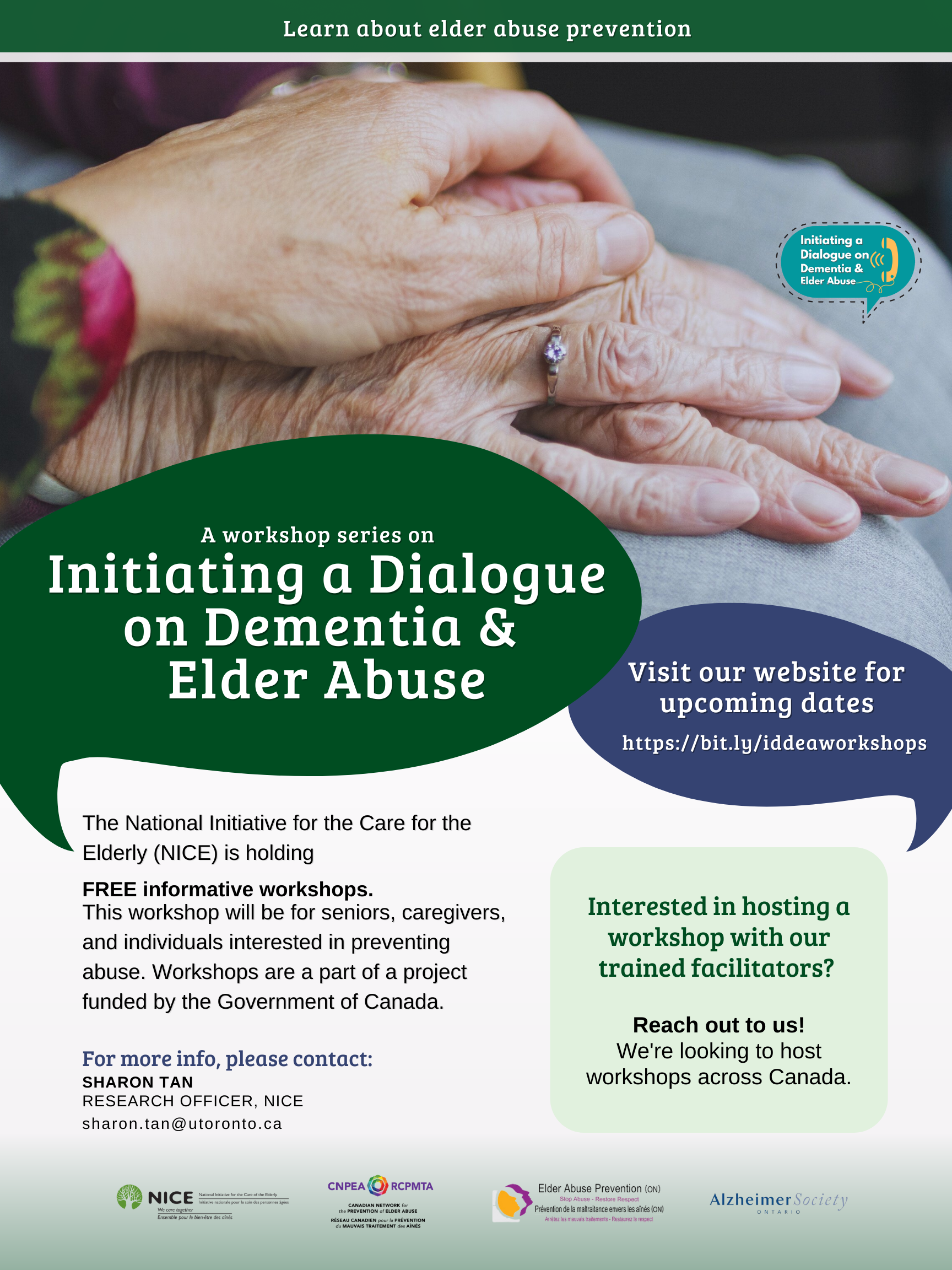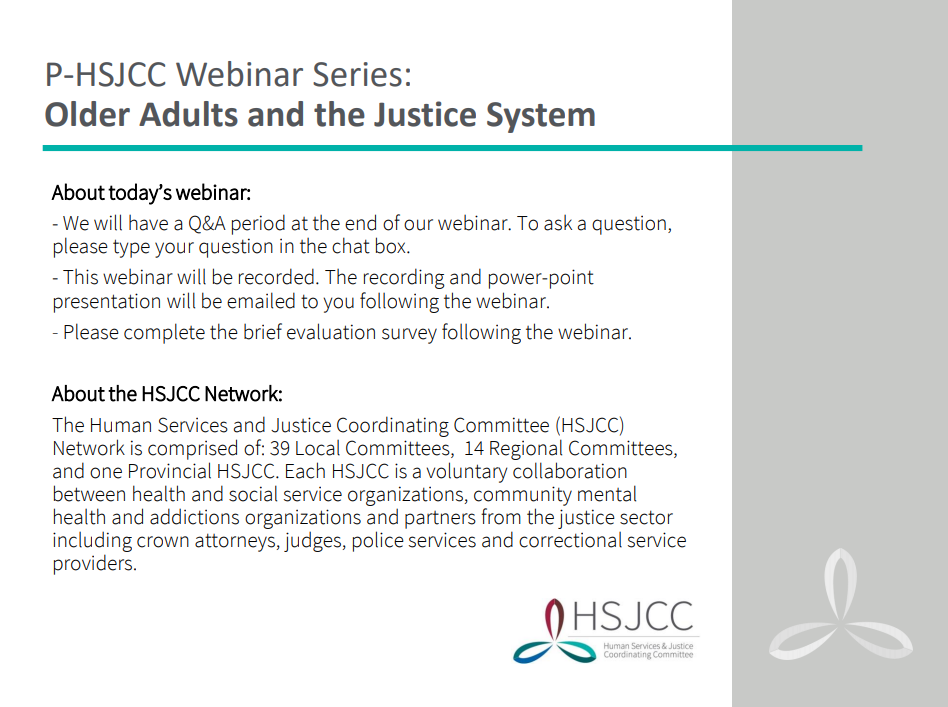A collaboration between CNPEA, NICE, EAPO, with the input and support of the Alzheimer's Societies of Ontario and BC.
 The goal of this virtual workshop is to help build a strong, informed system of support and prevention around older people living with dementia.
The goal of this virtual workshop is to help build a strong, informed system of support and prevention around older people living with dementia.
The workshop was developed for older adults living with dementia, as well as their caregivers, supporters, and friends. This peer-led workshop will be delivered by trained older adults, with the support of NICE.
It will be hosted online multiple times over the next few months. NICE will be adding dates throughout Winter 2021-22.
Upcoming Dates:
- January 25, 2022 (Part 1) - Jane and Finch Centre - 12:30pm EST. To register, call Khadan at (416) 786-7234.
- February 1st, 2022 (Part 2) - Jane and Finch Centre - 12:30pm EST. To register, call Khadan at (416) 786-7234.
- February 8, 2022 - Winnipeg Rainbow Resource Centre - Registration details TBD
- February 17, 2022 - Session in Spanish - Jane and Finch Centre - 12:30pm EST. To register, call Khadan at (416) 786-7234.
More information and contact
- To find out about more upcoming workshops, visit https://nicenet.ca/initiating-a-dialogue-on-elder-abuse
- If you are interested in facilitating or hosting a workshop, contact Sharon Tan, Research Officer, NICE at
- To learn more about the project, check out our recent blog post.
In this presentation, Kathy Majowski explores the following:
- What Does Bullying Look Like?
- What happens to people who are bullied?
- What about people who witness bullying?
- Red flags -What you might notice
- What We Know About Bullying
- How Can I Help?
- Community Resources
Gutman, G. (2012, June 11). Older Adult Bullying: Psychological Abuse by a Different Name? Retrieved from https://cnpea.ca/en/knowledge-exchange/workshops-and-presentations/923-older-adult-bullying-psychologicalabuse-by-a-different-name.
Madsen, K. (2018). Seniors Bullying Project: Overall Summary of Ontario-Wide Thinktanks. Retrieved from https://www.sheridancollege.ca/research/active-research/serc/bullying-between-older-adults
Goodridge, D., Heal-Salahub, J., Pausjenssen, E., James, G., & Lidington, J. (2017). Peer bullying in seniors’ subsidised apartment communities in Saskatoon, Canada: participatory research. Health & Social Care in the Community, 25(4), 1439–1447. doi: 10.1111/hsc.12444
Lamothe-Begg, L (2012) Older Adult Bullying Prevention [PowerPoint Slides]
Speakers:
Dr. Kirsten Madsen, PhD, faculty member at Sheridan College.
Pat Spadafora, MSW, Kaleidoscope Consulting, founder and former Director of the Centre for Elder Research, Sheridan College
Learning Objectives:
Hear first-hand accounts of the important research being conducted on seniors bullying from the researchers involved in these projects.
Learn about the preliminary outcomes of the project and how to better understand this complex issue.
A partnership between Sheridan College & Elder Abuse Ontario to better understand what is happening in Ontario and to use this data to create a resource package outlining best practices for seniors and those working with seniors to stop bullying.
Speakers:
Dr. Kirsten Madsen, PhD, faculty member at Sheridan College.
Liza Franses, older adult advocate
SLIDES
Source: Elder Abuse Ontario
Presenters:
Sarah Denton, Clinical Intake Specialist – NE BSO North Bay Regional Health Center, Kirkwood Place
Phyllis Fehr, Board Member Alzheimer Society of Brant, Haldimand Norfolk, Hamilton Halton and Ontario Dementia Advisory Group
A.J. Grant-Nicholson, Mental Health Strategy Lead, Legal Aid Ontario
Katie Almond, Probation and Parole Officer, Ministry of the Solicitor General
Christine Conrad (Moderator) Policy Analyst – Justice Lead, CMHA Ontario
Host: Human Services and Justice Coordinating Committee
Download the slides, by clicking on the image below:
View the webinar (scroll to the bottom of the page)
For the first time ever, there are more Canadians aged 65 and older than Canadians below age 15. As Ontario begins to feel this demographic shift, all areas of the justice system are encountering older adults at a more frequent rate. Often these interactions involve age-related conditions like dementia, mental health conditions, and/or substance use, and the traditional justice system is not designed to meet the needs of this vulnerable population.
Over the past year, the Provincial Human Services and Justice Coordinating Committee has developed a navigational guidebook to help caregivers, care partners and service providers of older adults and adults with age-related conditions navigate the justice system. In anticipation of the guidebook’s release, this webinar will provide an overview of this project, highlighting key issues and promising practices identified during its development. We will be joined by subject matter experts from across the human services and justice sectors to discuss key considerations relating to older adults and adults with age-related conditions and their interactions with police, courts, and corrections, as well as the civil mental health system.
Source: Human Services and Justice Coordinating Committee
Page 1 of 31
















